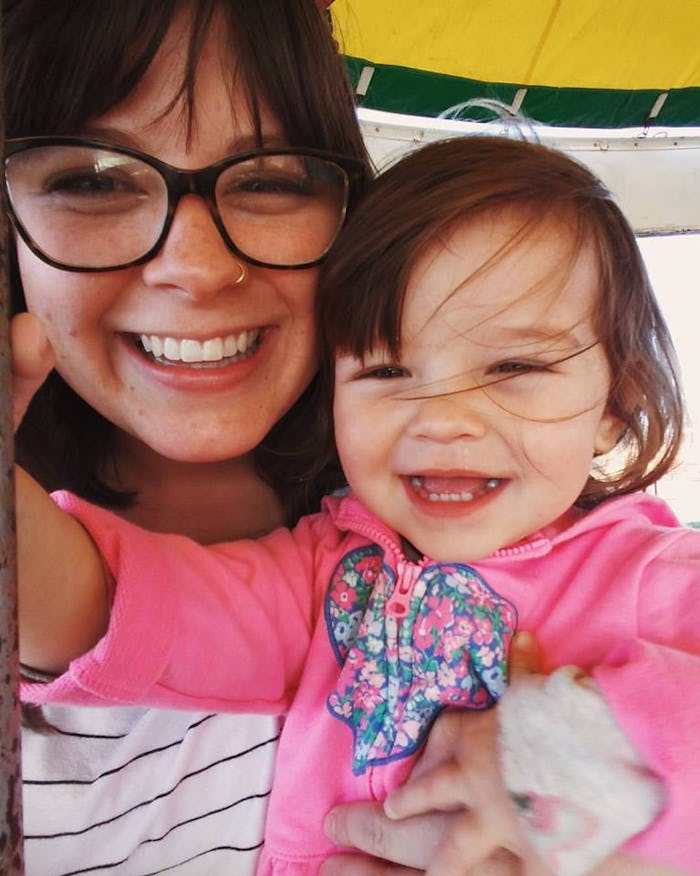Life

I Breastfed Through My D-MER & This Is Why
Following the birth of my first child, after working through the initial difficulty of learning to breastfeed and wincing through the pain of cracked and blistered nipples, I realized something wasn’t right about the way I felt about breastfeeding. Whenever I'd go to feed, I'd feel intense, negative emotions as soon as my milk let down. Typically, these emotions were paired with nausea and desperate thoughts of hating myself or feeling detached from my child. I was so confused by these intense feelings; I was concerned these symptoms suggested something was wrong with me. Was this the first sign of intense postpartum depression? Would I be able to keep breastfeeding my child? I didn't know at the time, but I had D-MER, and I breastfed my baby anyway.
Furious Googling led me to the website of a non-profit organization — D-MER.org — dedicated to spreading education concerning Dysphoric Milk Ejection Reflex (D-MER). According to their website, D-MER is “a condition affecting lactating women that is characterized by an abrupt dysphoria, or negative emotions, that occur just before milk release and continuing not more than a few minutes.” A little more searching, and I learned that experts who've studied D-MER describe it as an uncommon disorder only present in a small percentage of moms.
When I found their website, I felt relieved at first. Everything they were describing explained what I was experiencing in perfect detail. I found so much comfort in knowing my symptoms were real, that other women had been through the same thing, and that it seemed to be a simple hormone imbalance causing the symptoms. (A case study performed by lactation consultants Alia Heise and Diane Wiessinger hypothesized that a drop in dopamine may happen when letdown occurs, but that has yet to be confirmed by further study.) But my relief didn’t last long. I also learned that most treatment options for D-MER had barely been tested, and even though most doctors were opting to use commonly prescribed antidepressants, known as selective serotonin reuptake inhibitors (SSRIs), to treat D-MER, they were seeing very little results.
I hate to say it, but looking back it's very clear to me that I kept breastfeeding for all the wrong reasons.
There was so little research available concerning D-MER that I felt concerned about bringing up what I was experiencing to my doctor. I was afraid of how she'd respond. I was a brand-new mom and I didn’t want her to hold it against me or have concerns about my ability to parent my child. So I felt like I really only had two choices: I could throw in the towel and switch to bottle feeding, or dig in my heals and stick it out. As a new mom, I felt opting for formula was basically admitting failure, and I was surrounded by moms who were succeeding at breastfeeding. And all the Facebook groups I was a part of seemed to only encourage other mothers to breastfeed since, as they believed, “breast is best.”
If hadn’t kept breastfeeding, I likely wouldn’t have even attempted to breastfeed my second daughter, and I would have missed out on the beautiful breastfeeding relationship we had for 15 months of her life.
I hate to say it, but looking back it's very clear to me that I kept breastfeeding for all the wrong reasons. I learned to stick out breastfeeding through my D-MER by distracting myself while nursing simply because I felt pressured to breastfeed. I didn’t feel free to make a different choice. It wasn’t anyone’s fault, but I just couldn’t imagine explaining why I chose formula to my friends and family, or even worse, having to explain D-MER to anyone who asked.
Even though my motivation for continuing breastfeeding was not great, over three years later, I'm actually really glad I stuck with it. If I hadn’t kept breastfeeding, I wouldn’t have known that my symptoms would begin to ease up right around six-weeks postpartum and then slowly taper off before my daughter was 6 months old. If hadn’t kept breastfeeding, I likely wouldn’t have even attempted to breastfeed my second daughter, and I would have missed out on the beautiful breastfeeding relationship we had for 15 months of her life.
Now, with another baby on the way, I won’t be breastfeeding because I feel guilty, because I feel like formula is "evil," or because I feel pressured by the people around me. I plan to breastfeed even if I have D-MER again because I've found support from online friends. These are women and mothers who've experienced the same symptoms as I have and I can talk to them about what I've been through. Now I know from experience that the worst of the symptoms won't last, but if, for some reason they do, I'll be better equipped to seek out the help I need.
Most importantly, I plan to breastfeed my third child through the symptoms of D-MER because, for me, the reward outweighs the sacrifice. That's probably not the case for many women, and I understand why anyone experiencing D-MER would decide that further breastfeeding wasn't the right choice for them. In my case, I feel in the aftermath that nothing has contributed to a strong foundation of bonding with my child quite like the time they spent breastfeeding. My experience with D-MER has been one of the harder parts of being a new mom, but it hasn’t been so hard that I want to give up on something that's meant so much to me, my children, and our relationship with one another. I'm just glad that with my third child, I feel like I'm choosing breastfeeding willingly, not out of shame but because it feels worth it to me.
This article was originally published on